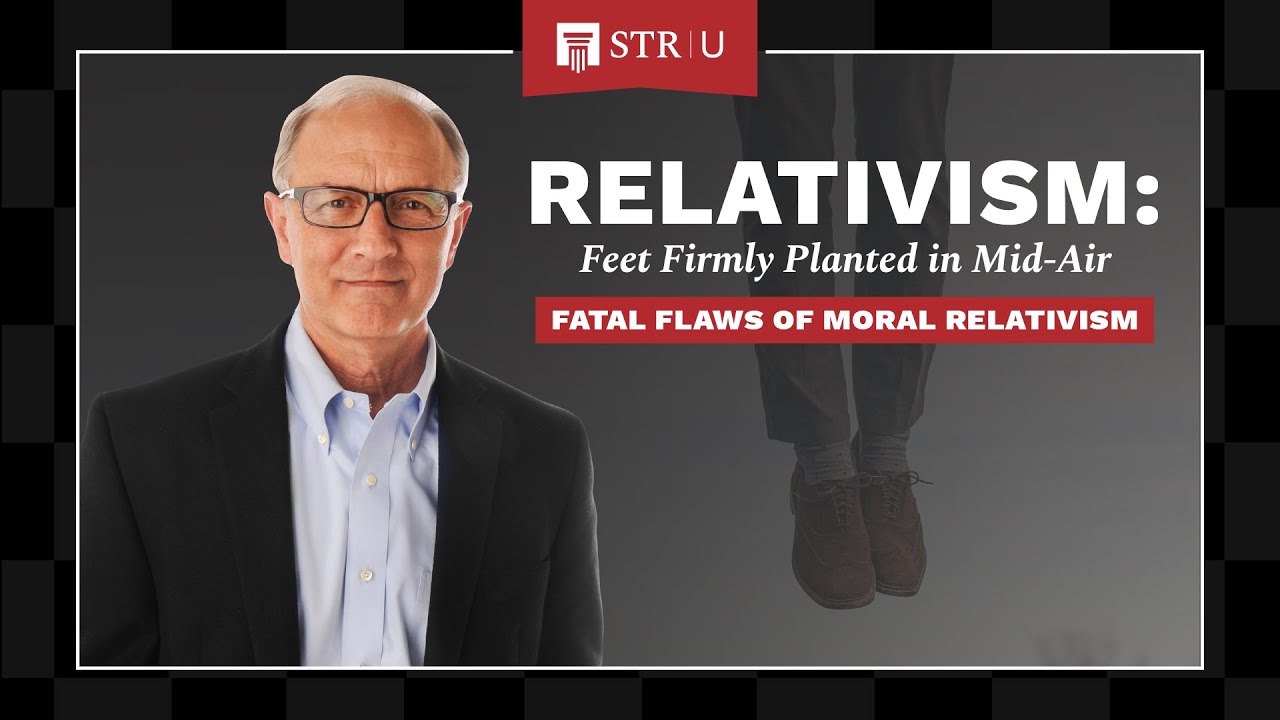
Fatal Flaws of Moral Relativism – Stand to Reason University
In this clip from his latest Stand to Reason University course, Greg Koukl considers the logical consequences of relativism and shares five fatal flaws of moral relativism. Look for the complete course, “Relativism: Feet Firmly Planted in Mid-Air,” at https://training.str.org/index/.
#StandtoReason #STRUniversity #Apologetics #Christianity #Worldviews #Morality #Relativism
————— FIND MORE FREE APOLOGETICS VIDEOS —————
Stand to Reason University is an online training program designed to produce a particular kind of person: an effective ambassador for Christ. Using short, interactive, and engaging courses, STR U equips Christians to make an even-handed, yet gracious defense for Christianity and Christian values in the public square.
Sign Up: https://training.str.org/index/
————— DISCOVER MORE FROM STR —————
Website: https://www.str.org/
Stand to Reason Apps: https://www.str.org/apps
————— CONNECT —————
Twitter: https://twitter.com/STRtweets
Facebook: https://www.facebook.com/standtoreason93
Instagram: https://www.instagram.com/standtoreason
LinkedIn: https://www.linkedin.com/company/stand-to-reason/
————— GIVE —————
Support the work of Stand to Reason: https://str.org/donate
source











This can't be compelling to those who recognize that Greg's usage of "moral" already entails his god. As his point is rendered circular, there isn't anything to chew on.
If we define moral nihilism and moral absolutism as follows, where would moral relativism fall?
Moral Absolutism = at least one moral principle cannot be destroyed by man.
Moral Nihilism = every moral principle can be destroyed by man.
Thank you Sir.
Atheists who want to be consistent have to deny an obvious feature of reality: objective morality, and it’s an awfully high price to pay. The problem with relativism grounded in human subjects is that humans are multiple and they are whimsical. There are many of them, resulting in many “moralities,” and their moralities change over time because they are not grounded in anything fixed and moral in itself.
But [God] is a personal being, but he is also the ground of being. He doesn’t arbitrarily give commands according to his changing whim—ordinary subjectivism—because God doesn’t change. Rather, his commands flow forth from the objective quality of his unchanging, morally perfect nature.
Here are some additional resources on relativism:
Relativism: Feet Firmly Planted in Mid-Air
https://rsn.pub/3SbHXXN
Relativism Self-Destructs
https://rsn.pub/3vTCRYU
Encountering a Relativist
https://rsn.pub/3vHtJ9p
A Society Where Justice Is Grounded in Preference
https://rsn.pub/48Tqj2k
“Society Says” Relativism
https://rsn.pub/48Oobsp
But moral relativism is entirely consistent with moral objectivism. Shape, for instance, is a paradigm example of an objective property. Yet an object's shape is relative. It can be one shape at one time, and a different shape at another.
Relativism – at least in the moral context – is the view that moral properties can vary. What's right in one context may be wrong in another. An action's rightness or wrongness is 'relative' to something, then – typically to its consequences and intentions (virtually no one would deny that morality is relative to that extent). The more controversial version of moral relativism is the view that morality is relative not just to consequences and intentions, but also to time and space – that is, that what is right here and now, could in principle be wrong over there or later, holding other things equal. Note, when people say 'morality is relative' they typically mean to express the more controversial 'relative to time and space' version of the view.
The opposite of relativism is 'absolutism' (not – note – subjectivism….subjectivism is the opposite of objectivism).
Absolutism is the view that morality is not relative. And as 'relative' is normally taken to mean 'relative to time and space', 'absolutism' will typically mean 'does not vary over time and space' (after all, absolutism is implausible if it is the view that the morality of an act is not relative to anything at all…..) And among absolutists many would hold that morality 'cannot' vary over space and time (that's a stronger claim than that it merely does not). To hold that morality 'cannot' vary over space and time is to hold that moral truths are necessary truths.
The important point is that relativism and absolutism are opposing views about how moral properties BEHAVE.
Subjectivism and objectivism are opposing views about what moral properties are made of. That is, they are opposing views about morality's composition. Not its behaviour then, but its composition.
Subjectivism is the view that morality is made of subjective states. Objectivism is the view that it is not.
Morality is subjective, not objective. If it was objective, it wouldn't require God! God's a subject – a subject of experiences, a mind, a person. And morality is made of God's subjective states. So it is SUBJECTIVE, not objective.
There are a lot of theists who are promoting the idea that morality is objective. No it isn't. Objectivism is the enemy! Again: if morality is objective, then it doesn't need God.
There are also a lot of theists out there who seem to think that morality is absolute in the strong 'necessary truth' sense of the term. That is, they believe moral truths are necessary truths.
That too is really an enemy-of-theism view that should be attacked, not endorsed. For if moral truths are necessary truths then God does not exist. God is omnipotent and so can do anything. That includes changing what's right and wrong. Thus, if God exists then moral truths are not necessary truths (indeed, there are no necessary truths if God exists, for God can falsify any proposition whatsoever).
these points are all wrong, actually, as a criticism, as they make incorrect assumptions.
1. Yes, this is true, no one can be objectively accused of anything. But this is not needed, as morality is a group thing – defines "us" versus "them". We are the ones who accept XYZ moral statements, subjectively if you will, and those evil ones accept ABC instead, and thus we are enemies. Christianity itself offers a boatload of examples, see heresy claims.
2. It's fine, I never liked that argument, even though I am a firm atheist. If we consider an omniscient God as opposed to non-omniscient humans, we are not in the position to say that evil actually exists, we don't know enough. Especially not as opposed to an omniscient God, who would have a better understanding of the affairs. Yes, life might suck, but probably it is the best available. Or God's plan, or whatever. The problem of evil is not the basis of my atheism.
3. Sure we can – praise means "you are one of us", blame means "you are not one of us = potentially, or even likely, you are an enemy". See 1.
4. Yes, because there is no direction towards which you can "improve". Except, again, the fitting to your ingroup. You can be a better member. This if of course subjective, as no groups are universal.
5. I don't want to promote tolerance, it's stupid. What we have is "recognizing similarity, so there is nothing to tolerate at all", or enmity, if this is not given.
I can't tell if you're arguing against idea of Moral Relativism or the people who believe in Moral Relativism?
Moral relativism is a metaethical thesis that the truth or justification of moral judgments is not absolute, but relative to the moral standard of some person or group of persons. If God exists and is the source of morality, then moral relativism is true. Is Greg therefore arguing against the existence of God as the source of morality?
Very compelling! Could you share how to access the course? I tried clicking the link, but only two courses appeared, and neither was the course on moral relativism. Thanks so much!
This was such a great teaching video. I have listen, read and viewed a number of Mr. Koukl material about Relativism, but this video was concise and easy to digest. Great job!
Of course those who claim to be relativists will object to this, but they will give you all sorts of reasons why you are wrong…
Excellent material. More of this! 🙂
Good job, Greg.
Thank you
Killing an abortionist isn't attributable to moral relativism if it protects and rescues an intended abortion victim from homicide.